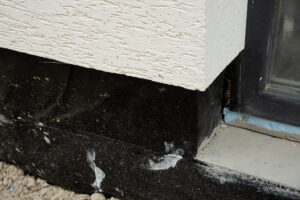Winter in New Jersey produces a lot of snow, due to the extreme freezing conditions.
The sole means for the snow to melt away is in the event that there are favorable warmer conditions for that.
This mostly happens during spring, when the weather starts warming up.
This shouldn’t be a problem because nature is doing its thing, right?
Well, sometimes when the thaw is too heavy, it could cause unexpected flooding.
This is most likely if you consider the fact that spring also has frequent rains and often experiences rising groundwater levels.

Is Your Basement Getting Wet In The Spring?
This excess water can find its way into your property, and head to your basement. While here, it could trigger significant property damage. Since you have no intention to face such issues, it makes sense to be proactive and come up with the right techniques to prevent long-term challenges. This article looks at exactly that.
Understanding Spring Thaw
It takes place once snow and ice formed during winter start to melt away, causing an overflow. At times, this water can be too much that it overpowers the existing drainage system, especially if the ground remains frozen and is not in a position to absorb the excess water. When the water seeps into the basement, it has the capability to cause significant damage.
Reasons Why Spring Thaw is Your Basement’s Worst Enemy
Spring thaw in your underground space could have a lot of consequences: it can lead to destruction of the house’s integrity, structural issues, electrical hazards, formation of mold and mildew, and reduced value of your property. These problems could be stressful and expensive to deal with, a key reason to consider prevention.
Things to do to Avoid Spring Thaw Wreaking Havoc on Your Basement
Fix Drainage
Among the finest techniques to fix basement flooding triggered by spring thaw is to actually fix all your drainage problems. Drainage has the potential to be problematic because if the water gathers in your residence, it may trigger flooding.
The first thing that you can do here is to remove all the snow that is directed to your home. This reduces the chances of draining towards your basement in case it suddenly melts away. You should also check that your gutters and downspouts are flowing naturally. This is crucial because if they are clogged, water could build up leading to problems.
Lastly, be sure to do a good analysis of your landscape and ensure that it is not slanting towards your house. If you identify any shortcomings, it might be a great idea to consult a landscaper to help level things out for you.
Seal Foundation Cracks
Cracks and openings create perfect entryways for water to seep into the basement. The best way to prevent this from happening is to seal those cracks in your foundation, walls, and floors. This is a very important home maintenance routine that not only helps to prevent damage but also deters entry of pests into your home. As you do the sealing, remember to use the right sealant for the kind of material that you are working on.
Waterproofing
Waterproofing is one sturdy solution that you can never go wrong with, especially if you are looking for a long-term solution to basement flooding. The reasoning behind this is that it offers that extra layer of protection, which might help keep water out in case of a spring thaw.
There are two types of waterproofing – exterior and interior. For the exterior, it entails excavation to apply coatings and sealants to foundation walls and the installation of systems like French drains. As for the interior technique, it entails managing water that gets into the basement by installing systems around the perimeter. One common method used here is utilizing sump pumps to remove accumulated water.
As you have seen in this article, spring thaw in New Jersey can be quite detrimental, especially once the water gets into the basement. It not only causes the destruction of property but leads to the growth of mold and mildew.
Since these issues can be quite expensive to fix, you simply don’t want them to affect you altogether. The only way to make this a possibility is to be proactive and prevent the problem from happening in the first place.
Some things you can do to protect your basement include sealing foundation cracks, improving your drainage system, and waterproofing.
If you are looking for the best waterproofing company in New Jersey, then be sure to give us a call today.



